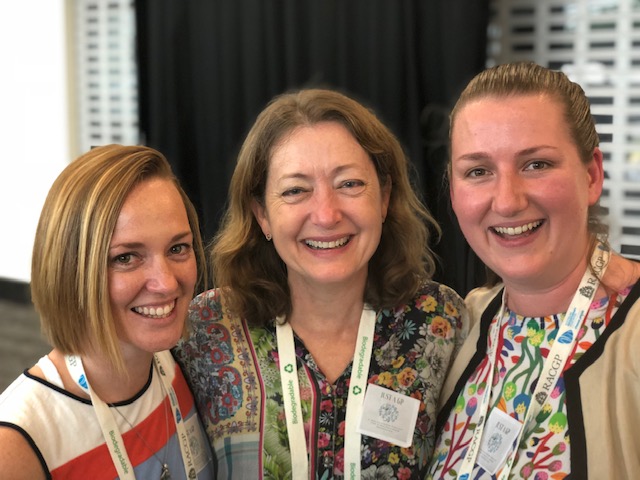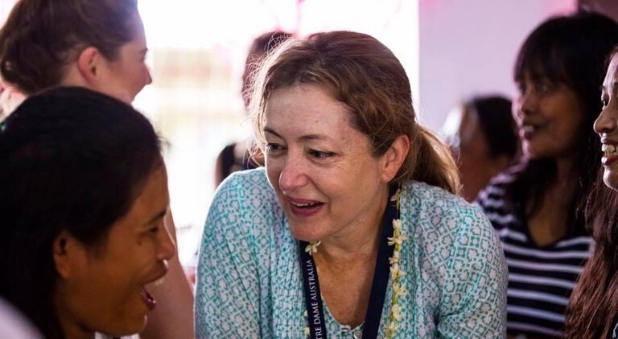With restrictions easing, and people itching to get back to all the things we’ve been missing, Associate Professor Dr Charlotte Hespe is urging Christians to be very thankful and proceed with caution.
A GP specialist who owns a practice in Glebe, Dr Hespe wears many hats. She is also the academic GP at the University of Notre Dame, heading up the department of general practice and primary care research. She sits on the NSW Health clinical council and, since the pandemic, has been the GP advisor to the public health unit response team for NSW Health, assisting Dr Kerry Chant in making medical recommendations relating to General Practice to the public health unit.
Making the most of mass disruption
The pandemic has not only brought stress and fear to our society. Dr Hespe, who attends St Barnabas’, Broadway, observes that the mass disruption to normal life has presented many opportunities to share faith.
“I was very struck, particularly when everyone was banished to home, that there was a real lack of meaningfulness of anything,” she says. “It made me extraordinarily thankful that I had faith. I knew a hope, and despite the despair and fear around us at the time, I knew my existence was about my relationship with God rather than anything else. It made me more aware that there were an awful lot of people who didn’t have that, so they were in a far more precarious state. ”
“I knew my existence was about my relationship with God rather than anything else.”
“The virus has given us huge opportunities. Our society is extraordinarily self-satiated – we are very complacent. In Australia, we’re very fortunate that, by and large, most people's needs are met. There are a large number of socially vulnerable people who that doesn’t apply to, but the majority of people are housed and fed. It’s very easy to ignore God, to ignore spirituality, or instead to turn to self-gods, to idolatry of material possessions, worshipping crystals and the people around us. When disruption occurs, it makes people question what's going on. Spiritual conversations are very hard to have with people who are complacent.”
Our healthcare workers are weary
Many doctors are still exhausted, adjusting to major changes for several months now. The introduction of Telehealth has been a good medium, but has also brought disruption and anxiery for Dr Hespe’s colleagues.

“They are more emotionally exhausted with their daily schedule than they would normally be,” she says. “A lot of people are not presenting with acute medical issues because they’re scared, so there’s been delayed diagnoses. We fear that we’re missing things unwittingly by using a medium that we are not familiar using and may not be ideal for all scenarios. A lot of patients are choosing to have phone appointments, which is not as good as video, which is not as good as face-to-face. It’s a great medium to do what we have to do in the current time of COVID, but we fear missing things to the detriment of the patient.”
“In NSW only 4.7% of COVID infections were health care workers. That is much less than the rest of the world.”
Dr Hespe asks that we would keep health professionals in our prayers. “Pray that people will restore their emotional banks – that they can go home and feel safe,” she says. “We don’t have the same fear we had before, that everyone was being exposed and taking the virus home with them. People were so worried about their family members.
“Give thanks that in NSW only 4.7% of COVID infections were health care workers. That is much less than the rest of the world. That’s because we have been careful about being safe. Even though we didn’t have enough personal protective equipment, we most of the time were able to do that.”
There is much to be thankful for
She also praises God for the efforts many churches made to continue teaching God’s word – something that made a big difference to her and her family. “It was nice to see that support as a Christian. I was impressed with how my church family organised itself into running church and growth groups and communicating well.
“One of my biggest prayers is thankfulness. When we can see how awful it is in the rest of the world, we are extraordinarily lucky. Yes, it has caused anxiety and we’ve had a number of deaths. But I keep thinking how fortunate we are: that we have such a good health care system; that our government has responded well.”
“Continue to be respectful of social distancing and [take] hand and face hygiene measures…”
As restrictions change, Dr Hespe warns that we must continue being vigilant to prevent a second wave.
“The biggest thing is that everyone needs to be mindful,” she says. “The best way to do a good job is to continue to be respectful of social distancing, and hand and face hygiene measures. That is how the virus spreads. Even if there are hidden pockets of infection, we can still remain safe.
“For us to continue to be like that we need to continue to test, to pick up new cases immediately, and chase down any potential cases – hence the COVIDSafe app. We can do this with lots of testing, everyone being aware and continuing to not put themselves in situations where the spread will go wild.”






















